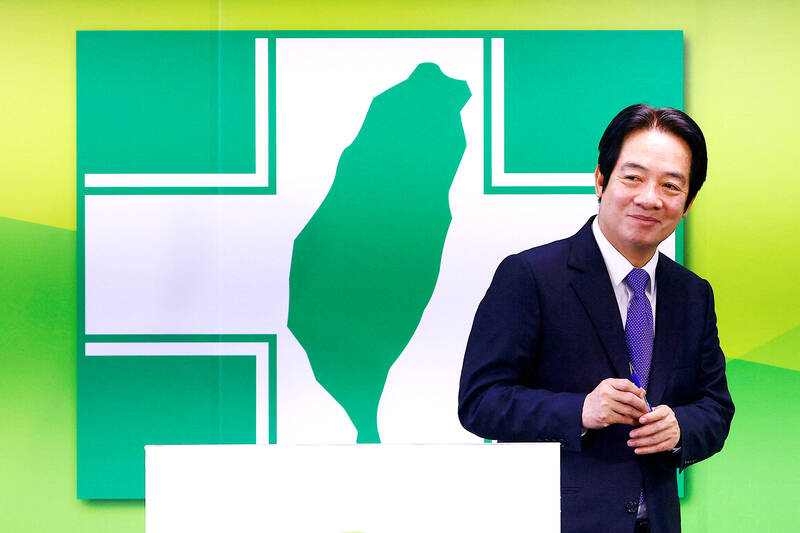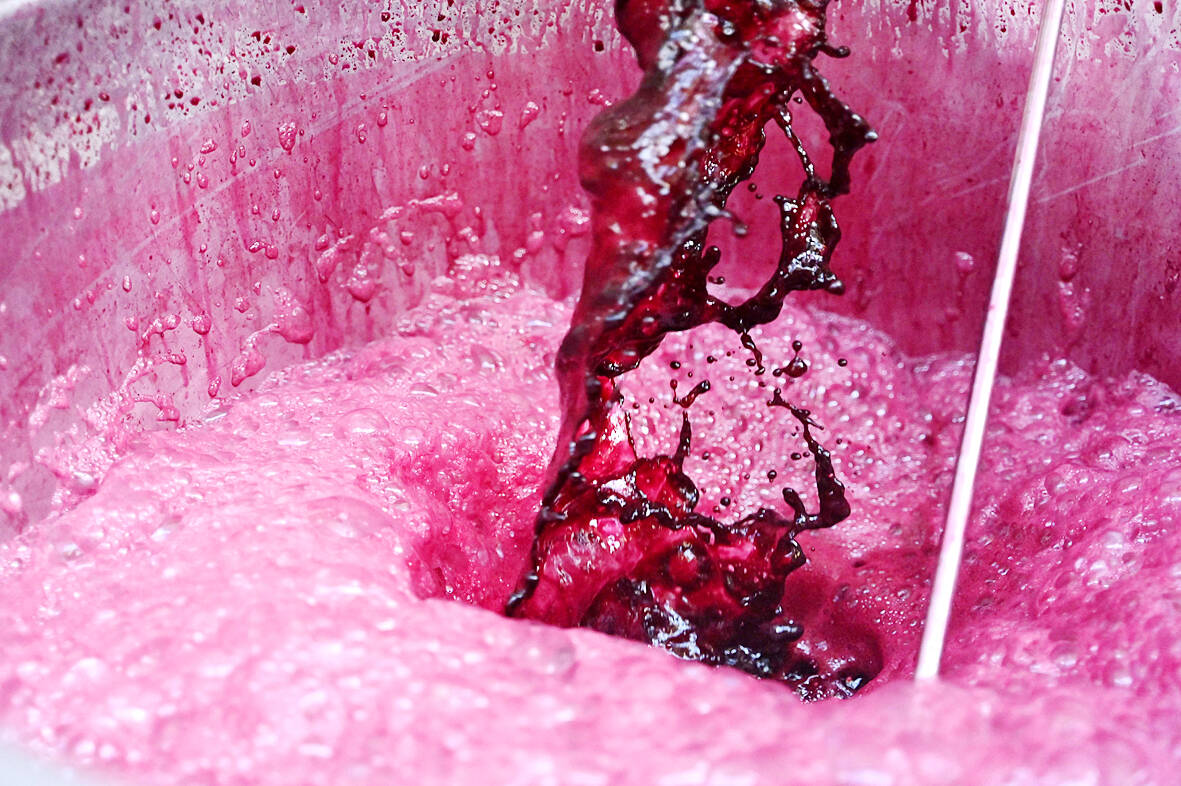Earlier this month, Vice President William Lai (賴清德) was elected unopposed to the chairmanship of the Democratic Progressive Party (DPP). As the chair, Lai is now the presumptive presidential candidate for next year’s election. Even as he became chairman, the global media was sending out signals about the coming fight we face to redefine Lai.
As he accepted his new role, he made a statement on independence. He said that he “pragmatically considers Taiwan as already a sovereign, independent country, therefore there is no need for a separate declaration of Taiwanese independence.”
This calm statement, DPP boilerplate now for over two decades, was no different than any that current President Tsai Ing-wen (蔡英文) has made.

Photo: Reuters
For example, after winning the election in 2020, in an interview with the BBC Tsai observed: “We don’t have a need to declare ourselves an independent state. We are an independent country already and we call ourselves the Republic of China, Taiwan.”
Clearly Lai is positioning himself as a mainstream candidate offering a position on the status of Taiwan with broad appeal inside and outside Taiwan. In fact his position is boring. It’s been that way for years.
Lai sometimes refers to himself as a “political worker” for Taiwan independence. In 2018 he had a roundtable in which he described what that meant. He laid out three tenets for that.

Photo: AFP
First, Taiwan is already a sovereign, independent state, so no need to declare independence. Second, only Taiwan’s 23.5 million people can decide its fate. Third, Taiwan must be promoted and cared for so that it garners the support of its people.
MAINSTREAM POLITICIAN
Lai’s positions on these milquetoast and mainstream ideas are easily found on the Internet. Yet there was the Financial Times on Jan. 16 shrilling that “Taiwan presidential contender sparks US concerns over China tensions,” (Kathrin Hille, Jan. 16) as if nothing had happened in China-Taiwan-US relations since Chen Shui-bian (陳水扁) was president. Hille, who is a wonderful journalist, probably didn’t write that malign clickbait headline.

Photo: AFP
The headline itself is an old trope of early 2000s vintage, under which the Taiwan side is held to account for China’s desire to annex it, and is blamed for the possibility of tensions rising.
The main text of the article, thankfully, explains that this position is not held by anyone who actually understands Taiwan, and quotes longtime Taiwan expert and US-Taiwan Business Council head Rupert Hammond-Chambers to good effect. But the Financial Times piece is one signal of how the chattering classes are going to treat Lai: guilty, and unable to ever prove innocent.
The clickbait usefulness of the “Lai as independence nut!” has long been out there. In 2017 when Lai was appointed premier, there were several pieces offering takes similar to this South China Morning Post gem: “The appointment of William Lai ... as Taiwan’s new premier has raised concerns over the future of cross-strait relations, given his tough, pro-independence stance and strong man image” (Will Taiwan’s new, hardline premier mean choppier waters for cross-strait relations? Lawrence Chung, Sept. 6, 2017).
The premier has little if any discernible influence on foreign policy, but that did not stop the writer, a longtime journalist here, from reaching for that clickbait.
Similarly, in 2019, when Lai ran against Tsai in the DPP primary, we saw another round of this.
“Taiwan’s presidential primary pits Tsai against China hardliner” Asian Nikkei told us (Kensaku Ihara, June 12, 2019). Yet anyone following the primary in Taiwan could easily see that Lai followed the DPP line and did not differentiate himself meaningfully on the independence issue. Lai knows perfectly well that anyone who becomes the president must govern from the center where Taiwan’s already-independent state is a mainstream view.
We are certain to see more portrayals of Lai as a hardliner, even (perhaps especially) from people who should know better, as we have seen for the last three years.
FETISHIZING THE ‘I’ WORD
There are two worrisome issues here. The first is the vast ignorance about Taiwan, even among people who write about it.
On Twitter, a novelist who has written a (very good) thriller about a Taiwan war highlighted one of Lai’s posts of his utterly banal views, saying that Lai’s remarks were a “moment of the day” right out of his novel, adding in a follow-on tweet: “Look man, we will give you all the weapons and ammo you need. Just don’t say the ‘I’ word at least until after we give it to you ffs.”
In reality, we’ve been saying the “I” word for 25 years. It’s just that people aren’t listening to how it is said or bothering to understand why it is said the way it is.
These attitudes are widely held. Similarly a defense analyst who works on Chinese People’s Liberation Army (PLA) development and Taiwan security issues, said “Strong statements on his first day!”
Does Taiwan need to do more explaining? It’s been explained often enough.
Despite there being no way that any elected government of Taiwan could “declare independence” (who could make such a declaration? How would it be approved? By what process? Popular referendum? The law bans referendums on the nation’s status), the rather stupid idea that Taiwan could declare independence and plunge the region into war at any moment retains a grip on many minds outside the nation.
It is strange to regard the Taiwanese, who are a conservative people addicted to the status quo in the way the rat in the famous experiment pulling on a bar repeatedly to get cocaine is addicted, as having the potential to roll out of bed one morning and declare independence. That means getting out of bed early, for one thing.
The idea that Taiwan is full of crazy independence buccaneers restrained by Washington makes a nice psychological balancing to the idea that China could invade, supports plenty of both-sidesism, makes the Taiwan issue neat and easy to understand and, of course, makes people inside the Beltway feel like they are being useful. It enables people to blame Taiwan for being threatened.
It’s just not true, though.
The scary part is that the US “concerns” in the Financial Times piece appear to be held by people with anti-Taiwan axes to grind. In the coming election period, assuming that Lai is the candidate, we are going to see piles of these pieces coming out from authors with ties to thinktanks that China funds.
Gird thy loins! The fight is just beginning.
Notes from Central Taiwan is a column written by long-term resident Michael Turton, who provides incisive commentary informed by three decades of living in and writing about his adoptive country. The views expressed here are his own.

April 14 to April 20 In March 1947, Sising Katadrepan urged the government to drop the “high mountain people” (高山族) designation for Indigenous Taiwanese and refer to them as “Taiwan people” (台灣族). He considered the term derogatory, arguing that it made them sound like animals. The Taiwan Provincial Government agreed to stop using the term, stating that Indigenous Taiwanese suffered all sorts of discrimination and oppression under the Japanese and were forced to live in the mountains as outsiders to society. Now, under the new regime, they would be seen as equals, thus they should be henceforth

Last week, the the National Immigration Agency (NIA) told the legislature that more than 10,000 naturalized Taiwanese citizens from the People’s Republic of China (PRC) risked having their citizenship revoked if they failed to provide proof that they had renounced their Chinese household registration within the next three months. Renunciation is required under the Act Governing Relations Between the People of the Taiwan Area and the Mainland Area (臺灣地區與大陸地區人民關係條例), as amended in 2004, though it was only a legal requirement after 2000. Prior to that, it had been only an administrative requirement since the Nationality Act (國籍法) was established in

With over 80 works on display, this is Louise Bourgeois’ first solo show in Taiwan. Visitors are invited to traverse her world of love and hate, vengeance and acceptance, trauma and reconciliation. Dominating the entrance, the nine-foot-tall Crouching Spider (2003) greets visitors. The creature looms behind the glass facade, symbolic protector and gatekeeper to the intimate journey ahead. Bourgeois, best known for her giant spider sculptures, is one of the most influential artist of the twentieth century. Blending vulnerability and defiance through themes of sexuality, trauma and identity, her work reshaped the landscape of contemporary art with fearless honesty. “People are influenced by

Three big changes have transformed the landscape of Taiwan’s local patronage factions: Increasing Democratic Progressive Party (DPP) involvement, rising new factions and the Chinese Nationalist Party’s (KMT) significantly weakened control. GREEN FACTIONS It is said that “south of the Zhuoshui River (濁水溪), there is no blue-green divide,” meaning that from Yunlin County south there is no difference between KMT and DPP politicians. This is not always true, but there is more than a grain of truth to it. Traditionally, DPP factions are viewed as national entities, with their primary function to secure plum positions in the party and government. This is not unusual